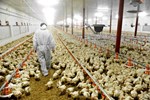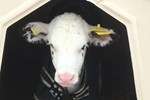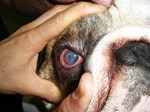Search - News & Events
291 - 300 of 828 results
-
RVC awarded international grant to further research into equitable and sustainable livestock and food systems
The Royal Veterinary College (RVC) has been awarded more than USD $339,160 from the Tiny Beam’s Kindling Initiative grant to continue Critical Research on Industrial Livestock Systems (CRILS) Network. CRILS aims to support and advocate for just and …The Royal Veterinary College (RVC) has been awarded more than USD $339,160 from the Tiny Beam’s …
-
New RVC research reveals extent and progression of bovine respiratory disease in UK dairy calves
New research from the Royal Veterinary College (RVC), combining thoracic ultrasound alongside the measurement of clinical signs, has revealed that nearly a third of calves in the UK experience bovine respiratory disease and subclinical pneumonia. …New research from the Royal Veterinary College (RVC), combining thoracic ultrasound alongside the …
-
New RVC research reveals improved outcomes over time for canine mitral valve repair surgery using a structured multidisciplinary approach
A new publication from the Royal Veterinary College (RVC), reveals that adopting a structured multidisciplinary approach to mitral valve repairs improves short-term outcomes for canines suffering from degenerative heart valve disease. While open …A new publication from the Royal Veterinary College (RVC), reveals that adopting a structured …
-
Shelling out the facts: New RVC study reveals most common health disorders of tortoises in the UK
New research from the Royal Veterinary College (RVC) has revealed beak abnormalities, overgrown nails and shell abnormalities as the most common health disorders affecting pet tortoises, terrapins and turtles in the UK. As the largest study of …New research from the Royal Veterinary College (RVC) has revealed beak abnormalities, overgrown …
-
New RVC research sheds light on best toys and housing to improve ferret welfare as well as those that pose serious risk
A new study from the Royal Veterinary College (RVC), has revealed the toys and environmental enrichments – enhancements to an animal’s environment to promote physiological and psychological wellbeing – that can directly impact ferrets’ health and …A new study from the Royal Veterinary College (RVC), has revealed the toys and environmental …
-
New RVC research sheds light on best toys and housing to improve ferret welfare as well as those that pose serious risk
A new study from the Royal Veterinary College (RVC), has revealed the toys and environmental enrichments – enhancements to an animal’s environment to promote physiological and psychological wellbeing – that can directly impact ferrets’ health and …A new study from the Royal Veterinary College (RVC), has revealed the toys and environmental …
-
New research reveals brachycephalic dogs are most susceptible to corneal ulcerative disease
New research from the RVC's VetCompass team shows short-nosed or flat-faced dogs are 11 times more likely to be affected -
Love is blind? Many owners of short-muzzled dogs are strongly bonded to their pets but unaware of health problems
Love is blind? Many owners of short-muzzled dogs are strongly bonded to their pets but unaware of health problemsThe largest study to date on the owners of short-muzzled dogs reveals close bonds between them and …
-
New RVC research reveals antibiotics offer no benefit in treating dogs with diarrhoea
A new VetCompass study from the Royal Veterinary College (RVC) has revealed that veterinary prescription of antibiotics at first presentation of uncomplicated diarrhoea in dogs causes no difference in clinical resolution of these cases. The study … -
The pawfect storm: study finds high levels of problem behaviours and use of aversive training methods in pandemic puppies
The average number of owner-reported problem behaviours among ‘pandemic puppies’ was five, with problem behaviours more likely in owners using aversive training techniques, says the Royal Veterinary College Four in five (82%) ‘pandemic puppy’ …The average number of owner-reported problem behaviours among ‘pandemic puppies’ was five, with …









